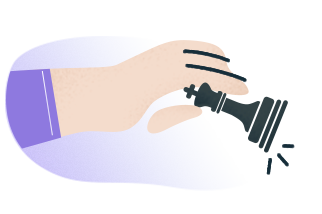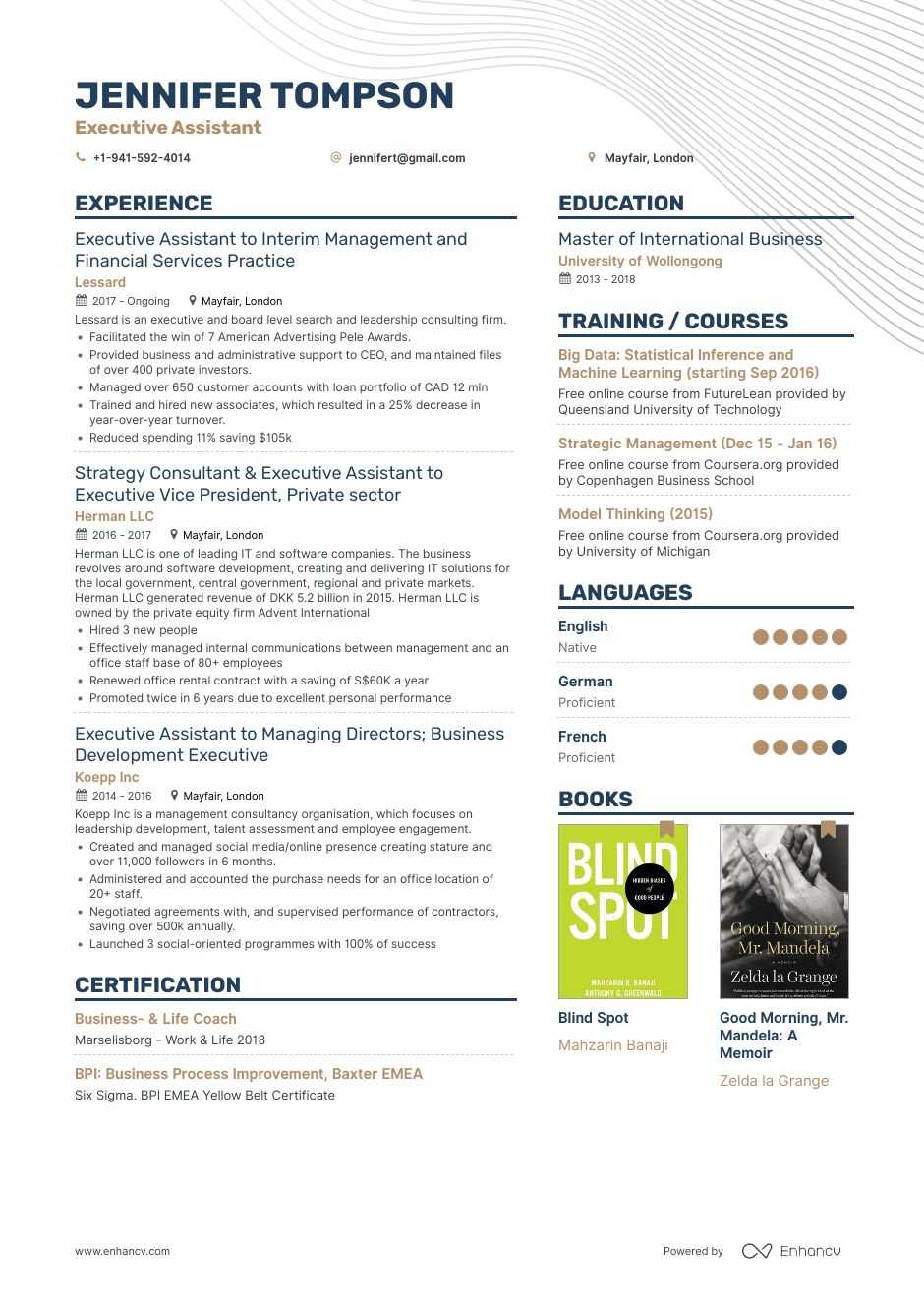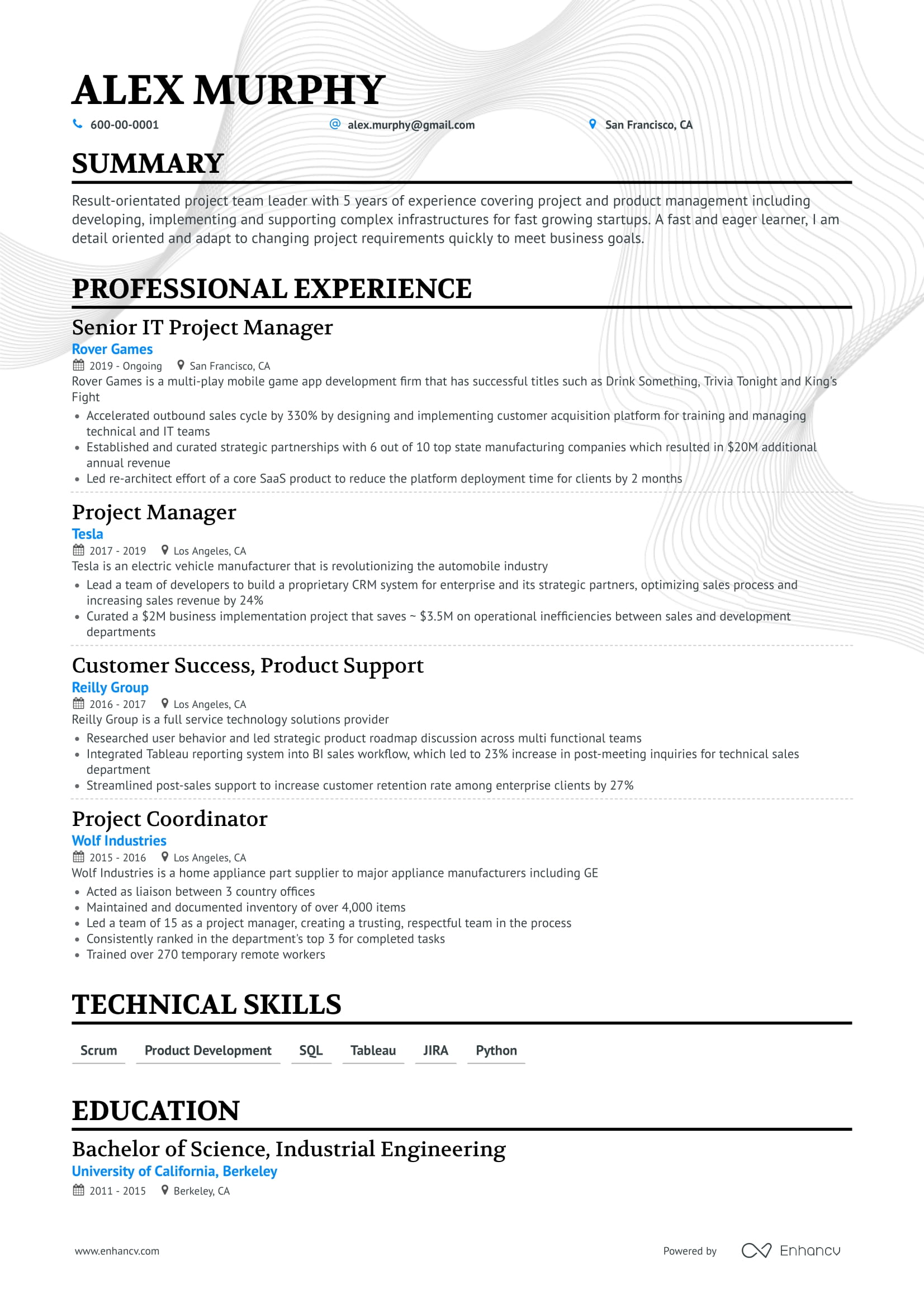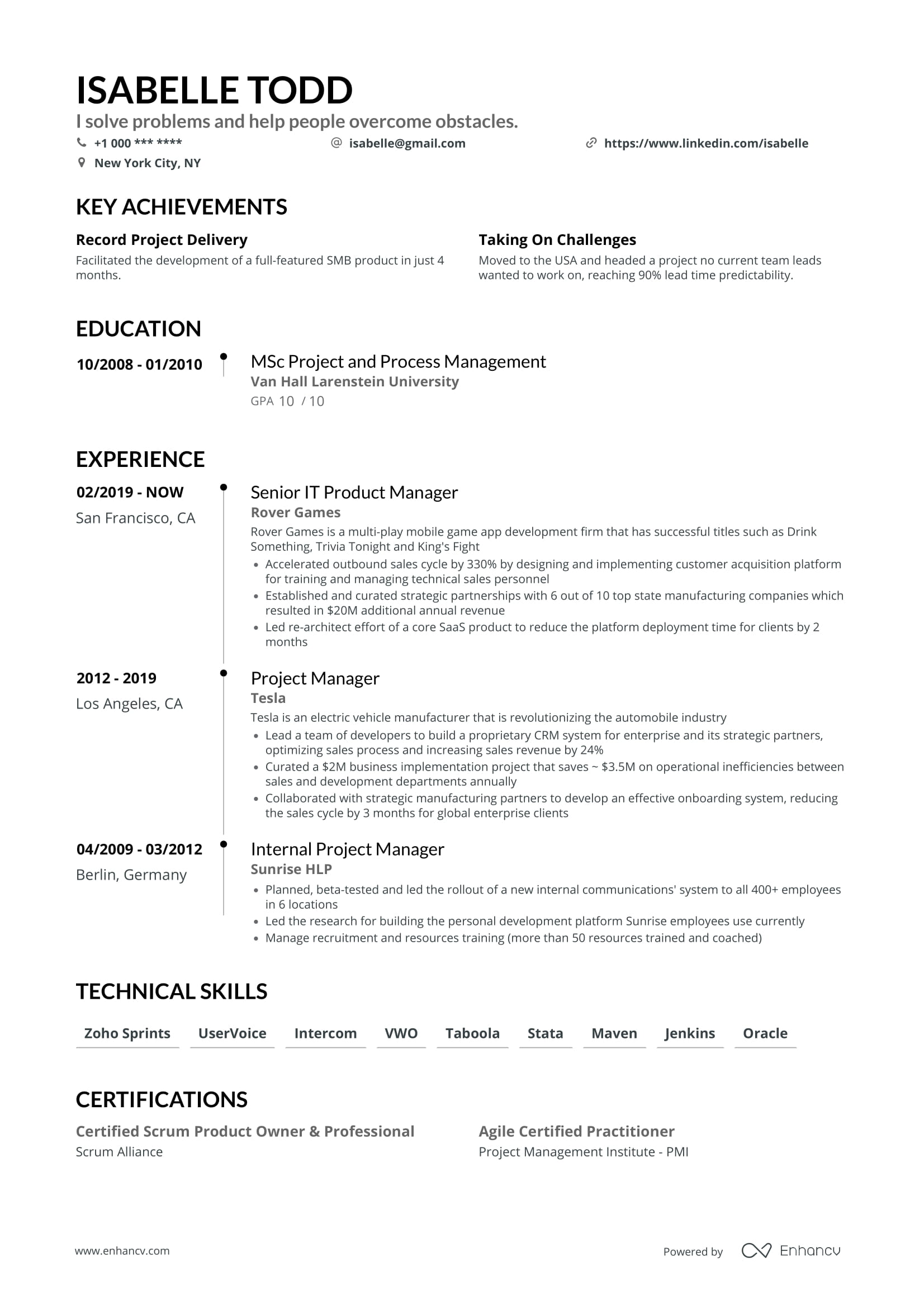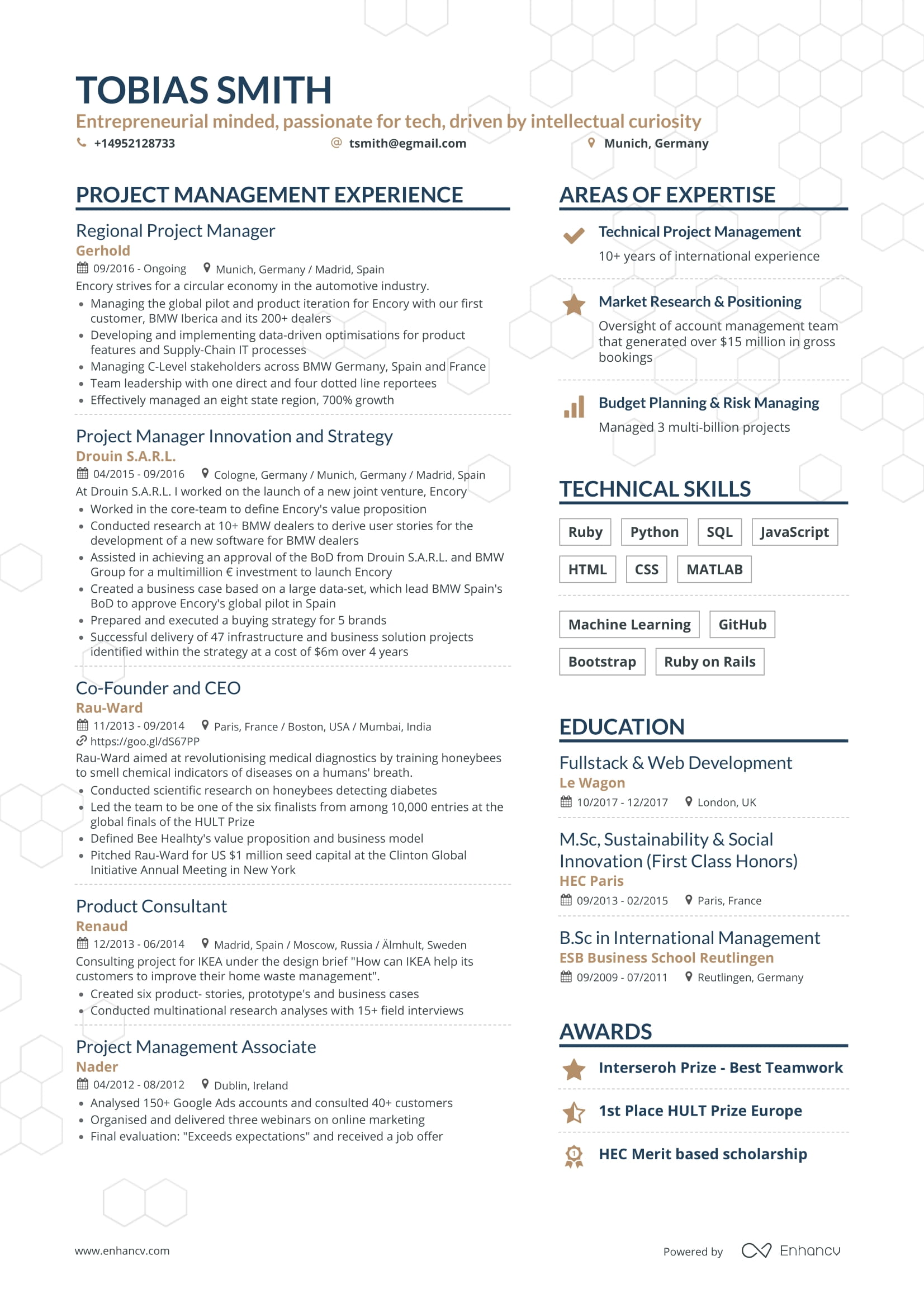Example Executive Assistant Resume - Browse more resume templates and build a stand-out resume
Ready to make an executive assistant resume that changes your life?
You deserve your dream job.
We know that because you’re essential to the success of any organization.
You’re the winning card the company gets to play whenever it is swamped with chaos and lack of order.
You complete the c level executive’s work and make them look good in front of everyone. You handle all the administrative tasks and duties, which keeps everyone on track.
Also:
You help them schedule meetings and stick to their calendars. And you take care of dozens of computer tasks and office management duties.
Beyond that:
You work with members and leaders from other departments to ensure flawless communication. And you’re responsible for phone calls and email management.
All that takes the burden off the executive’s shoulder.
You’re the wizard of order.
That’s why it’s super important to promote yourself as a fun, diligent person to be around.
Let the hiring manager realize that you’re the missing piece in their big puzzle.
How can I do that, you wonder?
That’s what you’ll learn in this resume guide.
We’ll teach you how to create an executive assistant resume sample to land interviews and get hired.
And we’ll look at some executive assistant resume examples to give you a better idea.
Ready?
What you’ll learn here
- Executive assistant resume samples you can use to land interviews and get hired
- The right way to write your header and summary sections
- How to highlight your work experience by listing the right tasks and duties
- 21 executive assistant resume skills to make you stand out
- 8 certificates to choose from when crafting your executive assistant resume
Executive Assistant resume example
Looking for a related resume?
How to write the best executive assistant resume
You know you’re right for the job.
You have enough knowledge about the role. And you possess the skills and qualities executive assistants need to succeed.
But guess what?
Your recruiter doesn’t know that.
And they never will, unless you tell it to them in your amazing resume.
The challenge for executive assistants making resumes is this:
It’s hard to quantify your job performance. And because of that, most of your hard work and achievements go unnoticed.
We understand how bad that feels for you.
You do a great job helping the CEO stay on track. And they may, sometimes, notice and acknowledge your work.
Yet, not everyone knows that.
That’s why you must make it your aim to be creative in highlighting your importance.
Here’s the key to landing the job:
You’ll show recruiters that you’re an experienced EA who takes responsibility at all times.
And you’ll highlight your outstanding communication skills and experience.
If you have any degrees or certificates, you’ll feature them in your resume.
Basically:
Your ea resume will prove to recruiters that you’re a professional worthy of their trust.
It will promote you as the best candidate for the job.
That’s how you’ll get hired.
Top executive assistant resumes contain these sections
- Header: your way of grabbing the attention of recruiters
- Summary: here’s where you spark their interest and make them read more about you
- Experience: your proof of competence and why you deserve the job
- Skills: to show that you know your way around any task you’ll face
- Education: highlights your long term knowledge and field expertise
- Certificates: prove that you’re serious and ready to invest more in your career
What recruiters expect to see in your executive assistant resume
- A reassuring work history to show the impact your presence will have on the company
- A sense of trust and honesty in you as proof of your ability to get any administrative task done within time
- Your long term career dreams being well aligned with the company’s vision for the future
- Excellent communication skills and computer knowledge to work on behalf of the executive
- Strong, soft/core skills to allow you to handle any administrative support tasks successfully
How to write the best executive assistant resume header
The header may seem like a trivial part of your resume.
But:
That's totally wrong.
Especially not in the eyes of Alex, the hiring manager at your dream company.
Alex has been skimming through resumes in his career for as long as he can remember. Whenever the company is hiring, he receives hundreds of resumes in his inbox.
He always ends up picking a few resumes to read carefully before choosing the right candidate.
Want to be one of the last applicants standing in the hiring process?
Create an eye-catching header to impress Alex.
Here are a few tips for writing your executive assistant resume header:
- Only include necessary information about you and your job
- List your information in the right order (name, job title, phone, email, location, website)
- Create a clear hierarchy between your header elements. For example: highlight your name and job title by making them slightly bigger
Now, for the important part:
Let's look at some live examples of executive assistant resumes.
You'll learn how to create a killer resume header that gets read.
2 executive assistant resume header examples
Choosing the right style is essential to making your header easy to read for the recruiter.
Be sure to use a modern, readable font with the right combination of colors and element placements.
Now, let’s cover some of the mistakes you can notice in the example above:
No current address:
Providing your current location is essential to hiring managers. Because, many times, they prefer to employ candidates living closer to the company.
Also, instead of using your full address, you may just list your city and region.
No LinkedIn profile:
Lots of recruiters now use LinkedIn to help them in the hiring process. It allows them to explore more applicants easily and learn about their endorsements, skills, and projects.
And:
It shows that you’re a professional with a strong personal brand.
Now, there’s one last detail to pay attention to — which is:
Use a professional email address.
We can’t stress this enough.
Whenever including your email, use a professional-looking email with Gmail or Microsoft.
But never use your current work address.
Here are some of the formats you can use for your email:
- firstlast@domain.com
- flast@domain.com
- firstl@domain.com
- first.last@domain.com
- f.last@domain.com
- first.l@domain.com
If none of them are available, try adding ea somewhere or using points.
Or, you can try switching between Microsoft and Gmail back-and-forth.
Wondering why we changed the job title in this example?
Here's the thing:
Executive assistants handle a wide variety of duties within an organization. And that makes the term "executive assistant" a little too broad.
Recruiters already know your tasks and understand your duties. But a unique title is an excellent addition to your resume in many ways.
It will help you stand out from every other candidate and prove your clear understanding of the role.
So, your new title must be:
- Clear and concise
- Popular in your industry so that it is easily recognized
- Based on the responsibilities you'll handle at the new company
- Focused on the value you'll bring once you're hired
How to craft a strong summary/objective for your executive assistant resume
Your resume summary is your elevator pitch.
Keep in mind that at this point, Alex still isn't sure whether he's going to read your whole resume.
You've captured his interest by writing a good resume header.
So, he wants to give you a chance.
However,
He won't hesitate to skip you if you waste his time. After all, he has hundreds of resumes in his inbox to go through.
Now:
The summary is the place where you'll make him excited about learning more about you. And you'll grab his interest by being different from others.
You won't give a lot of information or go into any details.
Instead:
You'll introduce who you are and what you're about. You'll talk briefly about your experience in the field. And you'll mention the skills that helped you achieve excellent results.
Here's what you'll talk about:
- Years of experience and plans for the future
- Skills and duties you were responsible for in your previous jobs
- Your educational background and certificates
Let's look at some examples:
2 executive assistant resume summary examples
Before you begin writing this section, you should know this:
Your executive assistant resume summary must be a few sentences long only.
It needs to promote you as a specialized expert and highlight your skills.
But most importantly:
It mustn’t be self-oriented.
In the example above, the summary is a bit specific to an executive assistant position. It features some of the skills and experiences the candidate has.
However,
It’s still imprecise.
For example, it uses vague sentences such as “+7 years” and “professional office settings.” And it doesn’t identify the certificates or background education the candidate has.
And even worse:
It ends with a self-centered expression. It shows hiring specialists that this application is all about the applicant and not the company.
So, let’s make some edits on it.
This example is everything the previous one isn’t.
It speaks directly to the hiring company’s needs by being specific in addressing its pain points.
It features tailored examples of what the candidate can do to help the executive at the new company.
But what makes it most compelling is this:
It’s well aligned with the company’s objectives. And that shows that you’re interested in the job and ready to go the extra mile once you’re hired.
How to highlight your work experience in your executive assistant resume
Executive assistants' duties differ a lot, depending on the hiring company.
There's a wide variety of tasks you can manage, but you won't do all of them in a single job.
As a senior, you'll have a lot to say in this section. You were responsible for dozens of tasks in your previous jobs and did them all successfully.
Yet:
Being a generalist shouldn't be your approach when writing your senior executive assistant resume.
Businesses want to acquire the best talent and recruit creative executive assistants. But, they don't like to risk the hiring process by going for generalists.
They want a specialist who can handle a specific set of tasks, which are often highlighted in the job application.
That's where you'll put your focus when writing the experience section.
We’ll share with you some executive assistant resume bullet points in the end.
But for now:
Let's look at a few executive assistant resume examples:
Executive assistant resume experience examples
This section lacks some key aspects every resume experience section needs to succeed.
First, it seems too generic.
There's no alignment between the hiring company's requirements and the responsibilities.
The duties listed above can work for anyone applying to an assistant position at any company.
Moreover:
It doesn't highlight the connection between work and results. It's not clear that the candidate's presence at the company is what led to its success.
And,
It doesn't include any precise numbers or examples.
In a way, it's saying that anyone could be responsible for answering the phone.
Although those may seem like trivial changes, they'll cost you lots of job opportunities.
Now, let's see a better example.
This is a much better sample than the previous one.
It’s more targeted towards a specific industry in the market.
The listed duties come in complete phrases that tell recruiters what they need to know.
And better yet:
The delivery is made even stronger through the use of direct action verbs.
It highlights, to a large degree, the value brought by the candidate’s presence at the company. And that’s achieved through the use of exact metrics.
That’s all you need to apply to make a top executive assistant resume.
Executive assistant resume bullet points and job duties
- Assisted in the preparation and execution of events and board meetings
- Attended meetings and took notes for review and debrief
- Coordinated travel arrangements, including flights, hotels, and ground transfers
- Answered phone calls and transferred messages to the CEO based on priority
- Managed the ever-changing CEO’s calendar and kept him updated
- Assisted with special assignments and projects when needed
- Maintained a high degree of professionalism at the workplace at all times
Student or entry-level? Here are tips for your junior project management resume
The demand for executive assistant jobs has always been high.
And that puts you in competition with candidates with all sorts of skills and experience.
Now:
As an entry-level executive assistant, you might think that you won't stand a chance. Right?
Wrong!
Results are what drive companies in today's economy. They don't care much about where you come from if you're qualified.
Also:
Writing an entry-level executive assistant resume is no different from writing a senior executive assistant resume.
You'll still apply 95% of what you learn in this guide. There will only be minor differences when it comes to job experience.
So, don't worry.
We'll show you how to make up for that in the next sections.
How to show your executive assistant skills on a resume
Now, let's talk about executive assistant resume skills.
The skills we're going to share with you in this section are critical to any executive assistant resume.
Yet,
You shouldn't copy-paste the list to your resume and cross your fingers that it will work.
Instead:
Your skills need to be specific to the job position you're applying for.
The answer is often in the job application — precisely, in the requirements part.
In that part, the hiring company provides you with the answer to how you can ensure to land the job. So, you need to read carefully through each line and identify their pain points.
Ask yourself:
- What are the biggest challenges the hiring company is dealing with?
- What characteristics are they looking for in a candidate?
- Which of their pain points can I address in my skill section?
You need specific skills and knowledge to thrive in the position.
You'll be hired to help an executive organize their workload and keep their duties in order. So, your office management expertise is the key to the success of the whole organization.
Now:
It's time to do some thinking on your own:
Get a pen and paper and write down all the skills you can help the hiring company with.
You may come up with a long list of skills, and that might be overwhelming to you. After all, it's hard to choose between a list of skills that could all be helpful.
That's why you must first understand the two types of skills required in any job position:
Hard skills and soft skills.
Hard skills are part of the technical knowledge you gather from taking courses or working at the position for a significant period.
They're often measurable and can be evaluated through your job performance.
For example:
- Running a machine
- Speaking a language
- Manipulating tools.
Soft skills, on the other hand, mainly depend on your personality and mindset.
You can learn and develop outside the workplace. Yet, they’re necessary for anyone to thrive in the position.
Soft skills cannot be measured or quantified. So, the difference in job performance is often evident through close observation.
For example:
- Communication
- Creativity
- Teamwork
Now that you understand that difference, let’s take a look at some examples.
We’ll show you the essential executive assistant resume skills and how to feature them in your resume.
How to list hard skills on your resume
9 technical skills to feature on your executive assistant resume
- Administrative support
- Travel booking
- Contact management
- Collaboration tools
- Email management
- Calendar management
- CRM systems
- Google Suite
- MS Office
How to describe soft skills on your resume
12 soft skills to feature in your executive assistant resume
- Collaboration
- Administrative management
- Attention to detail
- Interpersonal communication
- Planning
- Time management
- Prioritizing
- Expense reports
- Multitasking
- Resourcefulness
- Detail-Oriented
- Networking
Is education important for an executive assistant resume?
For most entry-level candidates, a highschool diploma might be enough to land them the job.
In fact:
Some companies don’t even ask about your educational background during the interview.
But as we said earlier:
Not all executive assistants handle the same tasks, and companies vary a lot in size and industry.
For instance:
Many corporations require a bachelor’s degree in the job application. That’s why it’s essential, always, to include a college degree in your resume if you have one.
Now, you might be wondering:
What required education is going to help me get hired?
Simply:
It’s an educational background in any business-related field.
For example:
- Business administration
- Office administration
- Corporate Management
- Human resource management
- Healthcare
- Fashion
- Marketing
- Finance
- Entertainment
All in all, a college degree is an excellent addition to your resume. It helps you stand out as a valuable candidate.
But,
It’s not the only vital thing in your resume.
What certificates do recruiters look for in top executive assistant resumes?
Adding a single certificate to your resume sets you apart from the rest of the pack.
It will open doors to endless opportunities and allow you to negotiate better salaries whenever you’re applying.
And the reason for that is clear…
Certifications show that you’re serious about your career.
They promote you as an experienced, professional candidate who deserves the job.
Top executive associate certificates and courses for your resume
- International Association of Accessibility Professionals (IAAP)
- Certified Administrative Professional (CAP)
- Certified Professional Secretary (CPS)
- Professional Administrative Certificate of Excellence (PACE)
- Professional Legal Secretary (PLS)
- Certified Legal Secretary Specialist (CLSS)
- Fundamental Payroll Certification (FPC)
- Certified Associate in Project Management (CAPM)
If you have many certificates, it's better to only list the most relevant ones to the job you're applying to.
However:
It's possible that you don't have certificates from our list. So, any certificate in office administration or office management can do.
How to write the best executive assistant resume
- A top executive assistant resume addresses the pain points of the hiring company. That starts with understanding the job application.
- Work history is one of the most important factors when it comes to hiring executive assistants. So, be sure to write a powerful experience section.
- Identify the duties you’ll work on in your new job, then build your whole resume around them.
- Feature your most reliable soft and hard skills to prove your competence. But, make sure to keep them unique and relevant.
- Highlight your certificates and past career achievements to gain competitive advantage over other candidates.
